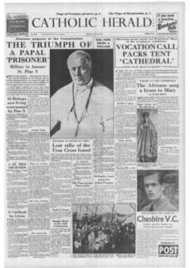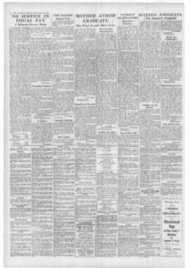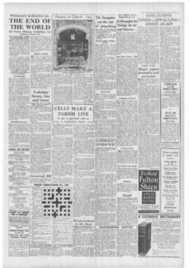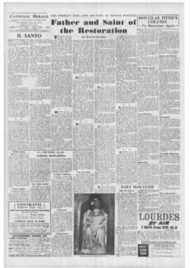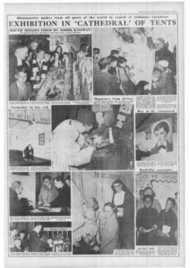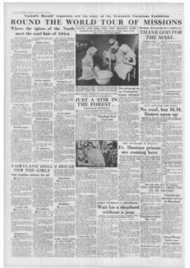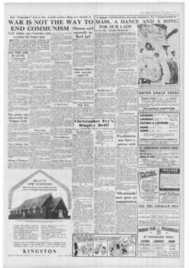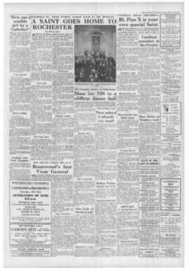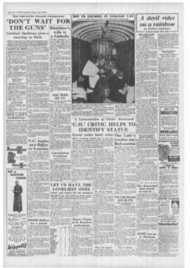Page 3, 28th May 1954
Page 3
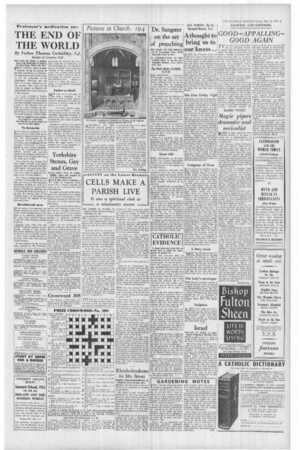
Report an error
Noticed an error on this page?If you've noticed an error in this article please click here to report it.
Tags
Share
Related articles
Joost De Blank Fund
Marian Groups' Revival
The Parish Lives Or The City Dies
Beginning Of Lent
Whitefriars Chronicle
CELLS MAKE A PARISH LIVE
It can a spiritual club or
•
sTi1111111111111111111111 a mtss ionary centre 111111111111111IIIIIIIN THE PARISH IN ACTION, by Joost de Blank, Bishop of Stepney (Mowbray, 9s. 6c1.).
A RCHB1SHOP CUSHING said in (la foreword to the English edition of Abbe Michonneau's famous Paroi.sse Missionaire, which appeared under the title Revolution in a City Parish:
"Catholic parish life, it is true, is strong in many parts of England and the United States. But all too often our parishes are far from possessing the truly Catholic concept of the term as it was used in the Middle Ages. Indeed, the element of all-embracingness has long since been forgotten.
"In the Protestant world of today the term 'parish' signifies much the same to the Catholic as it does to the Methodist or Baptist. The parish is a sort of spiritual club, the membership of which is composed of chosen adherents within a given area, who live their lives together and ignore all the other inhabitants of the area."
Dr. de Blank's main point in this useful book that is worth studying by Catholics, is that the same is true of the Anglican communion.
His second point is the same as that made by Cardinal Suhard and by the Abbe Michonneau himself: "A parish in a mission country must be a missionary parish." The Abb6 said that the modern city is a "mission country"; Dr. de Blank, from the Anglican view, says that, in effect, the whole of England is a "mission country" in these days.
THE first part cf this book, then, I is a statement of these theses, an "attempt to look with fresh eyes at our pastoral responsibilities and op
portunities." The second part, called "The Experiment," is an account of the author's attempt, as Vicar of Greenhill. part of Harrow. to make the parish a live, active missionary community. He writes: "If this missionary responsibility is the first discovery, the second is bound to follow: the usual programme of church activities will have to be worked out afresh in the light of our new understanding.
"A church is often completely cluttered up with a large _number of long-standing organisations which keep the clergy inordinately busy and give a superficial impression of a vigorous and healthy church life. Everybody feels satisfied until eyes are opened to see that it is the same small group that comes to everything, and consequently that the parson never has opportunity to do his evangelist and pastoral work in a wider circle."
Does not some of this apply to us, too?
Many of the "experiments" described have, of course, been practised in Catholic parishes for years; but there are also many "experiments" which we might indeed make our own, for they are no more than the application of common sense to the problem, and are in many instances already practised in many parishes in France, Holland and Germany.
THE first, and perhaps the most important of these experiments, is the organisation of the parish into areas, and the setting up in the areas of actin "cells."
The whole area of the parish is broken down into small ones-one or two streets at the most, sometimes even one street or one block of fiats. ln that district one house, one family, one person, takes on the leadership and becomes responsible to the parish priest or one of his assistants for making it the centre of Catholic Action in the immediate area.
When the hard-pressed clergy are able to visit the district, the "cell" becomes, as it were, the "chapel-ofease," say, for night prayers, the Rosary or some other devotion so that prayer and the supernatural are brought home to the people.
The applications of this basic notion are many. They range from the mere display of church notices in the windows of the house of the cell leader, and his keeping' an upto-date register of the people, to the organisation of meetings for prayer during Holy Communion for the sick in the district, or arranging for members of the area at least to be present representing the whole of the parish community on such occasions as baptisms. first Holy Communion and Confirmation.
blog comments powered by Disqus


